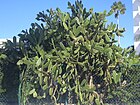Note: This is a project under development. The articles on this wiki are just being initiated and broadly incomplete. You can Help creating new pages.
Difference between revisions of "Opuntia cochinellifera"
| Line 1: | Line 1: | ||
[[File:Starr 070123-3682 Opuntia cochenillifera.jpg|thumb|right]] | [[File:Starr 070123-3682 Opuntia cochenillifera.jpg|thumb|right]] | ||
| + | '''Opuntia cochinellifera''' is a succulent, evergreen shrub or small tree growing 4 - 5 metres tall with a bole that can be 20cm in diameter. The stems are mainly spineless, probably the result of selective breeding to make the plants easier to harvest. | ||
==Uses== | ==Uses== | ||
| − | {{Uses|}}, {{Uses|}}, {{Uses|}}, {{Uses|}}, {{Uses|}}, {{Uses|}}, {{Uses| | + | {{Uses|Fevers}}, {{Uses|Mycoses}}, {{Uses|Swelling}}, {{Uses|Localized burning sensations}}, {{Uses|Pneumonia}}, {{Uses|Chest colds}}, {{Uses|Spleen problems}}.<ref name="Uses"/> |
==Parts Used== | ==Parts Used== | ||
| − | {{Parts Used|}}, {{Parts Used| | + | {{Parts Used|Fruits}}, {{Parts Used|Stem}}. |
==Chemical Composition== | ==Chemical Composition== | ||
| Line 28: | Line 29: | ||
==Habit== | ==Habit== | ||
| − | {{Habit|}} | + | {{Habit|Evergreen shrub}} |
==Identification== | ==Identification== | ||
| Line 47: | Line 48: | ||
==Mode of Propagation== | ==Mode of Propagation== | ||
| − | {{Propagation|}} | + | {{Propagation|Seeds}} |
==How to plant/cultivate== | ==How to plant/cultivate== | ||
| − | <ref name="How to plant/cultivate"/> | + | A plant of arid and semi-arid areas in the tropics, where it is found at elevations up to 1,500 metres, sometimes higher.<ref name="How to plant/cultivate"/> |
==Commonly seen growing in areas== | ==Commonly seen growing in areas== | ||
| − | {{Commonly seen|}}, {{Commonly seen|}}, {{Commonly seen| | + | {{Commonly seen|Hammocks}}, {{Commonly seen|Fields}}, {{Commonly seen|Sandy soils}}. |
==Photo Gallery== | ==Photo Gallery== | ||
| Line 68: | Line 69: | ||
<references> | <references> | ||
| − | <ref name="chemical composition">[ | + | <ref name="chemical composition">[Chemistry]</ref> |
| − | <ref name="Leaf">[ | + | <ref name="Leaf">[Morphology]</ref> |
| − | <ref name="How to plant/cultivate">[ | + | <ref name="How to plant/cultivate">[http://tropical.theferns.info/viewtropical.php?id=Opuntia+cochenillifera Cultivation]</ref> |
<ref name="Uses">Indian Medicinal Plants by C.P.Khare</ref> | <ref name="Uses">Indian Medicinal Plants by C.P.Khare</ref> | ||
</references> | </references> | ||
==External Links== | ==External Links== | ||
| − | * [ ] | + | * [http://www.flowersofindia.net/catalog/slides/Cochineal%20Cactus.html Opuntia cochinellifera on flowersofindia.net] |
| − | * [ ] | + | * [https://indiabiodiversity.org/species/show/259757 Opuntia cochinellifera on indiabiodiversity.org] |
| − | * [ | + | * [https://worldofsucculents.com/nopalea-cochenillifera-cochineal-nopal-cactus/ Opuntia cochinellifera on |
[[Category:Herbs]] | [[Category:Herbs]] | ||
[[Category:Pages without herbs images]] | [[Category:Pages without herbs images]] | ||
Revision as of 12:32, 10 June 2020
Opuntia cochinellifera is a succulent, evergreen shrub or small tree growing 4 - 5 metres tall with a bole that can be 20cm in diameter. The stems are mainly spineless, probably the result of selective breeding to make the plants easier to harvest.
Contents
- 1 Uses
- 2 Parts Used
- 3 Chemical Composition
- 4 Common names
- 5 Properties
- 6 Habit
- 7 Identification
- 8 List of Ayurvedic medicine in which the herb is used
- 9 Where to get the saplings
- 10 Mode of Propagation
- 11 How to plant/cultivate
- 12 Commonly seen growing in areas
- 13 Photo Gallery
- 14 References
- 15 External Links
Uses
Fevers, Mycoses, Swelling, Localized burning sensations, Pneumonia, Chest colds, Spleen problems.[1]
Parts Used
Chemical Composition
Common names
| Language | Common name |
|---|---|
| Kannada | |
| Hindi | |
| Malayalam | |
| Tamil | |
| Telugu | |
| Marathi | |
| Gujarathi | |
| Punjabi | |
| Kashmiri | |
| Sanskrit | |
| English |
Properties
Reference: Dravya - Substance, Rasa - Taste, Guna - Qualities, Veerya - Potency, Vipaka - Post-digesion effect, Karma - Pharmacological activity, Prabhava - Therepeutics.
Dravya
Rasa
Guna
Veerya
Vipaka
Karma
Prabhava
Habit
Identification
Leaf
| Kind | Shape | Feature |
|---|---|---|
Flower
| Type | Size | Color and composition | Stamen | More information |
|---|---|---|---|---|
| {{{5}}} |
Fruit
| Type | Size | Mass | Appearance | Seeds | More information |
|---|---|---|---|---|---|
Other features
List of Ayurvedic medicine in which the herb is used
Where to get the saplings
Mode of Propagation
How to plant/cultivate
A plant of arid and semi-arid areas in the tropics, where it is found at elevations up to 1,500 metres, sometimes higher.[4]
Commonly seen growing in areas
Hammocks, Fields, Sandy soils.
Photo Gallery
References
- ↑ Indian Medicinal Plants by C.P.Khare
- ↑ [Chemistry]
- ↑ [Morphology]
- ↑ Cultivation
External Links
- Ayurvedic Herbs known to be helpful to treat Fevers
- Ayurvedic Herbs known to be helpful to treat Mycoses
- Ayurvedic Herbs known to be helpful to treat Swelling
- Ayurvedic Herbs known to be helpful to treat Localized burning sensations
- Ayurvedic Herbs known to be helpful to treat Pneumonia
- Ayurvedic Herbs known to be helpful to treat Chest colds
- Ayurvedic Herbs known to be helpful to treat Spleen problems
- Herbs with Fruits used in medicine
- Herbs with Stem used in medicine
- Habit - Evergreen shrub
- Index of Plants which can be propagated by Seeds
- Herbs that are commonly seen in the region of Hammocks
- Herbs that are commonly seen in the region of Fields
- Herbs that are commonly seen in the region of Sandy soils
- Herbs
- Pages without herbs images






